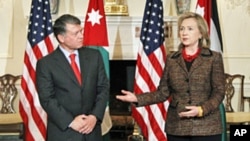In a week of intense activity on the Middle East, U.S. President Barack Obama is set to meet on Tuesday with Jordan's King Abdullah. The talks with the Jordanian monarch are expected to lead off a flurry of activity in the days before Obama leaves on a four nation European tour.
It will be King Abdullah's second White House visit since last September, when he and the leaders of Israel, Egypt and the Palestinian Authority sat down with Obama for Middle East peace talks.
At the time, Obama set a goal of achieving direct Israeli-Palestinian negotiations and a framework agreement for a two-state solution within a year.
Speaking in the White House East Room in September, King Abdullah said success of Israeli-Palestinian peace efforts would send a powerful message to extremists on both sides.
"There are those on both sides who want us to fail, who will do everything in their power to disrupt our efforts today," said King Abdullah. "Because when the Palestinians and Israelis find peace, when young men and women can look to a future of promise and opportunity, radicals and extremists lose their most potent appeal."
President Obama urged all of the key players to seize the opportunity for peace.
"This moment of opportunity may not soon come again," said President Obama. "They cannot afford to let it slip away. Now is the time for leaders of courage and vision to deliver the peace that their people deserve."
At the State Department, where he met with Secretary of State Hillary Clinton, King Abdullah said that even amid what is being called the Arab Spring, "the core issue still is that of the Israelis and Palestinians."
Although President Obama last week accepted the resignation of his Middle East envoy, George Mitchell, White House officials stress that the Obama administration's approach will not change.
Press Secretary Jay Carney said Mr. Obama's major address this Thursday on the Middle East will discuss the need for the peace process "to continue and succeed."
The few details that White House officials have provided, point to Mr. Obama using the address to lay out his view of the changes in North Africa and the Middle East, and how U.S. policy will respond.
The president will also make the point that popular uprisings present a fundamental challenge to the ideology of al-Qaida, which was weakened with the killing of Osama bin Laden.
Carney said the president will speak about his belief that the future will be written by the people of the Middle East, and that the world is seeing an "expression of long pent-up desire for greater freedom, greater prosperity, and greater engagement in the political process."
President Obama will remain focused on the Middle East up to his scheduled departure on Sunday for a four-country European trip.
On Sunday morning, he addresses the American Israel Public Affairs Committee, the largest pro-Israel organization in the United States. Israeli Prime Minister Benjamin Netanyahu, who is scheduled to meet with President Obama on Friday, will address the same group, and speak to a joint meeting of the U.S. Congress on May 24.
But as Israel and Palestinians blame each other for the impasse in peace efforts, experts say it appears unlikely that any of this week's events will lead to a major step forward.
Addressing Israel's Knesset on Monday, Mr. Netanyahu reiterated his condemnation of the political unity agreement between the Palestinian Authority and Hamas. Israel, the United States and European countries consider Hamas to be a terrorist organization.
Mr. Netanyahu said Israel is ready for "peace with compromises," but that "a [Palestinian] government, half of whose members declare daily their intention to destroy the State of Israel, is not a partner for peace."
The Israeli leader repeated a call for a demilitarized Palestinian state, with an Israeli military presence along the Jordan River. He said Israel must retain large settlement blocs in the West Bank and that Jerusalem must remain the capital of Israel.
A spokesman for Palestinian Authority President Mahmoud Abbas was quoted as saying that Netanyahu's remarks "proved once again that Israel is not interested in peace." Nabil Abu Rudeina called conditions outlined by Mr. Netanyahu unacceptable and said Palestinians maintain their plan to obtain United Nations recognition of a Palestinian state later this year.
In remarks on Monday, Mr. Abbas said the opportunity for a peace agreement still exists. But he accused Israel of waging a campaign against the Palestinian unity accord.
Obama, Jordan's King to Discuss Mideast Peace, Regional Upheaval
- By Dan Robinson














